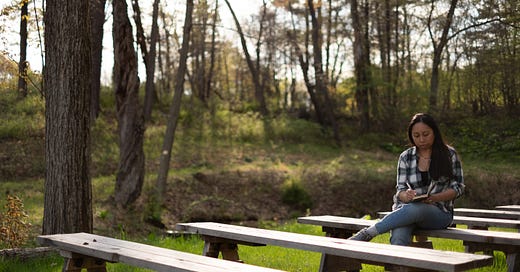A Look at Writing Groups and Programs
A brief guide for writers and introducing The Literary Craft Society.
If you’re a writer who’s spent any time on social media, you’ve probably noticed the exponential increase of online writing groups, workshops, and communities. There was no going back after virtual connection brought continuity and bigger reach to institutions and formerly only in-person groups and classes.
The upside is that writers of all levels could easily connect with fellow writers across the globe and access resources and lessons on demand. The downside is that it’s not as easy to know the level and quality of support, experience, commitment, and resources before joining. There’s no guarantee that they will match the expectations of the writer nor provide the benefits or results promised (or implied) in the sales page.
More than ever, choosing a writing community has become an exercise in trial-and-error which might feel overwhelming and discouraging.
So I thought I’d fire up this newsletter after a year’s hiatus with cliff notes about the different types of writing groups and communities, and how to choose which one would be best, depending on a writer’s goals.
Note: I’m not presenting this as the definitive guide for the subject. I’m sharing what I know from more than two decades of joining both in-person and online fellowships, workshops, and groups—as well as trying my hand at organizing writing groups myself.
But First, Let’s Talk About: MFA in Creative Writing
WHO IS IT FOR: Writers who can dedicate two years of study + financial means and safety net + focused on traditional publishing.
BENEFITS: “Built-in” literary connections and helpful credentials.
FEE (United States as of 2023): Ranging from $10,000 (city colleges) and $40,000 to $70,000 (private universities)
While this is more of a program and course of study than a writing group, I need to mention it because it’s considered the “gold standard” for those who are pursuing writing as a career. It’s an intensive program that requires two years of full-time study focused on craft, disciplined writing practice, and finishing a body of work under the guidance and mentorship of teachers, most of whom are widely published authors or reputable lecturers. Some programs have become known for their strength or specialization (genre, style, practice) and the success rate (in publishing) of their alumni.
Unfortunately, even after all this, having an MFA doesn’t guarantee a book deal or best-seller status for any author (although an overwhelming majority of literary authors with award-winning books and bestsellers have and MFA). But it helps to open doors to a literary and publishing network that’s not easy to come by.
And so on to the different types of writing groups and communities you may see online:
Residencies/Cohorts
WHO IS IT FOR: Writers who want to dedicate a specific block of time to focus on writing and finishing a piece or manuscript.
BENEFITS: Intensive mentorship + Less demanding than a full MFA + Close fellowship with fellow writers.
FEE: Typically from $499 (for virtual cohorts) to $5,000 (for residencies, depending on accommodations); Competitive residencies are subsidized and even come with financial stipends for chosen participants.
Writing peers or groups
WHO IS IT FOR: Writers who want to do things on their own, but seek fellow writers for regular feedback, encouragement, and motivation.
BENEFITS: Keeps writers accountable.
FEE: Free or suggested donation
Writing Community Memberships
WHO IS IT FOR: Writers seeking encouragement and motivation in a more established, moderated virtual or in-person space.
BENEFITS: Many are run by authors and/or publishing professionals. Regular writing accountability sessions, guests, virtual events, and forums to keep members on track. There are usually exclusive membership benefits and support as well.
FEE: $9/month to $99/month
Earlier this year, through the generosity of best-selling author and literary activist,
, I was given the opportunity to take part in building the kind of writing community that addressed writers needs beyond genre. Juliet started Literary Craft Society with a pioneer community of authors which grew to a hundred, and we worked together to continuously improve the space, lectures, and the discussions according to what the members needed.Finally, I can share more about what Literary Craft Society is all about as we open doors to new writers.
Modular Learning and Writing Community: The Literary Craft Society
WHO IS IT FOR: Writers who want to go deeper with their writing skills and appreciate the academic approach, but need more accessible, flexible, self-paced programs with professional mentors and a safe, moderated community. Drop-in and drop out as needed. Writers who have traditionally found it difficult to navigate these spaces, especially those who have physical limitations, difficult economic or living situation, marginalized identities, etc.
BENEFITS: Focused on demystifying the writing and publishing process for aspiring authors, this community started in early 2024. New members will join a vibrant community, which has close to a hundred members, as well as have access to recorded sessions. Beyond the accountability writing sessions, guests, and the private online platform, Literary Craft Society is building up lectures on writing craft, specific genres, self-editing, and writing tools—with mentors and an editor network to help members develop their stories. Starting December 2024, the community will start with in-person events as well.
FEE: $25/month: special “forever” fee for those who sign up within September.* Learn more about Literary Craft Society here.
*retain the $25/month fee as long as you keep continuous membership





Thank you for putting that together Neva. I feel so blessed to have met so many amazing writers both online and in person. Writing is a lonely process. It is good to connect with others. I look forward to out monthly meetings. PS - Great photo of you!